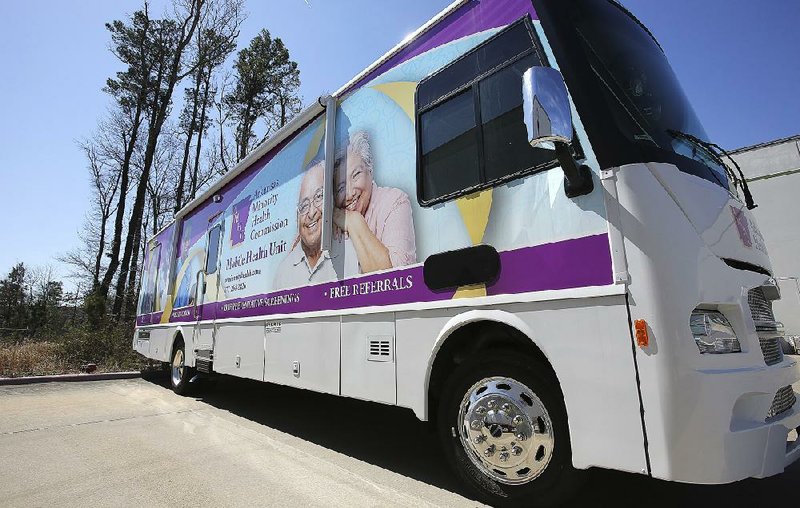Two mobile health centers designed to expand access to care for underserved groups are set to debut in Arkansas this spring.
The Arkansas Minority Health Commission's mobile health unit, a project that has been in the works since 2017, will make its inaugural trips to locations around the state in April. A mobile health clinic led by the New York Institute of Technology College of Osteopathic Medicine at Arkansas State University is scheduled to begin operations at northeast Arkansas sites in May.
They are part of an estimated 2,000 such centers in the United States, according to the Mobile Health Map research group. Researchers say they help bring health care to people from vulnerable communities, such as members of minority groups, immigrants or people experiencing poverty or homelessness.
"I'm really, really excited. It's here, it's live and we will start rolling [next month]," said Beatriz Mondragon, the Arkansas Minority Health Commission's health specialist and mobile health unit coordinator. "To me it's really important for the community to be able to reach these services."
Housed in a large, Americans with Disabilities Act-compliant bus, the health commission's unit is equipped with two screening rooms, an education room and a restroom.
It'll offer information about county-level health resources and free screenings for cholesterol, glucose, A1C, HIV, body mass index and oral health as a way to combat chronic conditions, such as diabetes or hypertension, that disproportionately affect minority groups.

The unit, financed through $292,000 in state general revenue and tobacco settlement funds, kicks off with a visit to Lee County Cooperative Clinic in Marianna on Wednesday and will most frequently be seen parked at food banks.
For people whose screenings raise red flags, unit staff -- comprising Mondragon, a driver and a nurse, though they'll have occasional help from University of Arkansas for Medical Sciences nursing students -- will provide information about nearby providers.
Visitors also will be tracked to make sure they followed up, which is a new idea within the state, Mondragon said.
"[Typically] you take their screenings and then that's it. That's usually how it is in health fairs," she said.
Although its emphasis is minority-group health care, anyone is welcome to request or use services, Mondragon said. Groups can request a visit from the unit through the health commission's website.
In northeast Arkansas, a mobile health clinic funded through a $828,748 U.S. Department of Agriculture rural development grant also is about to get off the ground.
The Delta Care-A-Van will offer preventive care including blood pressure and glucose screenings and additionally will assess visitors for anxiety and depression.
Through at least May 2020, the van is set to visit communities in the state's northeast region, including Harrisburg, Piggott, Walnut Ridge, Manila and Marked Tree, said Jennifer Wharton, Delta Care-A-Van project manager at New York Institute of Technology College of Osteopathic Medicine.
"Our focus really is on underserved and rural populations in Arkansas. We're hoping that we're able to reach those individuals and simultaneously provide students with valuable rural clinic training," she said.
Wharton has been working with stakeholders and community liaisons in rural areas to determine what specific needs aren't being met, such as women's health or care for senior citizens.
"It's not us just coming in and telling them what they need. It's them -- getting their perspective and their suggestions," she said.
Medical students from New York Institute of Technology College of Osteopathic Medicine, nursing and social work students from Arkansas State University and residents from a University of Arkansas for Medical Sciences-St. Bernards Healthcare program will staff the van.
The project aims to offer more than 250 students training working with rural communities in the state's Mississippi Delta region, which struggles with poor health outcomes and provider shortages.
Several other mobile units, including some that feature specialized services, have rolled into Arkansas in recent years.
In Northwest Arkansas, the Mercy health system has run a mobile unit since 2014. The University of Arkansas for Medical Sciences operates MammoVan, a mobile facility offering mammogram screenings.
Arkansas Children's Hospital also runs four mobile dental vans for children near central Arkansas, Northwest Arkansas, around Jefferson County and near El Dorado.
The dental vans generally visit schools and offer basic and advanced pediatric dental treatment with parental consent, said Anna Strong, Arkansas Children's director of child advocacy and public health.
The central Arkansas van served 716 children in fiscal 2018, and Strong expects that number to grow this year thanks to an extended visit to Arkansas Children's Southwest Little Rock Clinic.
Some children who use the van's services haven't ever been to the dentist, or haven't been in a long time, and the extent of their issues is "sometimes pretty disheartening," Strong said.
During hospital community needs assessments, some parents report that they don't have paid time off to take children to appointments -- one reason why this kind of outreach has become a strategy in public health.
"We know that about 80 percent of the factors that determine health outcomes actually happen ... in the communities and conditions where people live," Strong said. "Our work is really focused on getting out there and embedding ourselves within communities to meet people where they are."
Metro on 03/31/2019
